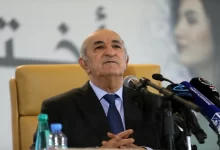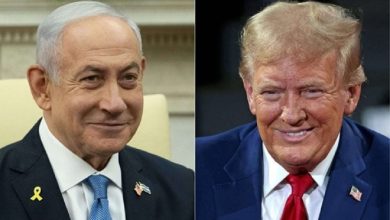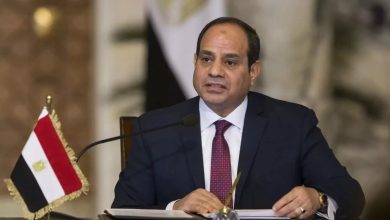Algeria’s Largest Islamist Party Rejects Tebboune’s Remarks on Potential Israel Recognition
The Movement of Society for Peace (MSP) warns against international pressure pushing Algeria toward normalization, reaffirming its steadfast support for Palestine.

Watan-The Movement of Society for Peace (MSP), the largest Islamist party in Algeria, has expressed reservations over President Abdelmadjid Tebboune’s remarks regarding his country’s willingness to recognize Israel on the first day a Palestinian state is established.
Several opinions voiced surprise at these statements, while others considered them a routine position for Algeria, which has supported the Arab Peace Initiative since its launch in 2002.
Growing International Pressure for Normalization
The increasing international pressure, particularly from the United States, aims to push resistant nations—including Algeria—toward the normalization of ties with Israel.
President Tebboune’s comments came in the context of a three-page interview, where he stated that “Algeria would be ready to normalize relations with Israel on the very day a full Palestinian state is established.” He argued that he was following in the footsteps of his predecessors, Presidents Chadli Bendjedid and Abdelaziz Bouteflika, on this matter. His remarks were followed by his stance on the new U.S. administration, leading many analysts to interpret them as an implicit message directed at then-President Donald Trump.
MSP’s Response and Concerns Over a Policy Shift
In a statement signed by its leader, Abdelali Hassani, the Movement of Society for Peace said it had taken note of the president’s remarks published in L’Opinion newspaper. The party reaffirmed that Algeria has always held a steadfast position on the Palestinian cause, rejecting settlement projects and normalization with the aggressive Zionist entity.
The statement reminded that President Tebboune himself had previously described normalization as an unacceptable rush toward an entity that does not recognize the Palestinian people’s rights and seeks to eliminate their cause while Judaizing the holy sites of the Muslim world. The party stressed that Algeria has always been and remains a strong supporter of Palestinian rights and a defender of the cause as one of liberation and justice.
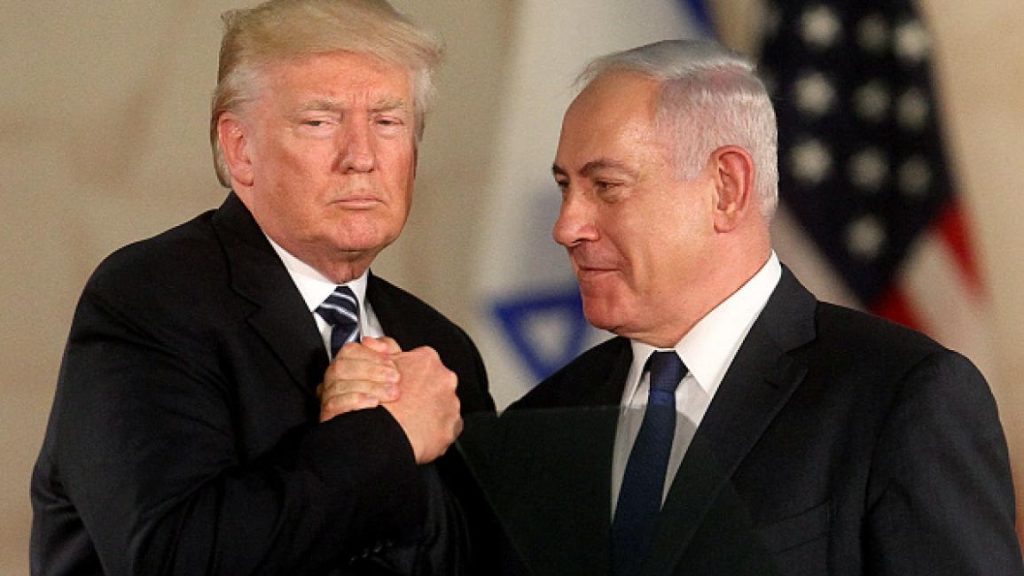
The MSP further warned that international pressures, particularly from the U.S., seek to drag Algeria and other resistant nations into the trap of normalization. It emphasized that Algeria’s position must remain steadfast in supporting legitimate Palestinian rights and rejecting all forms of normalization.
The movement also insisted that the Algerian people overwhelmingly oppose any path leading to normalization with Israel. Given Zionist crimes such as genocide, forced displacement, and the suffocating blockade on Palestinians, Algeria must take firm stances that strengthen Palestinian resilience instead of discussing political settlements.
Algeria as a Last Bastion Against Normalization
The statement underlined that Algeria will remain an impenetrable stronghold against any attempts to shift its unwavering stance on Palestine. It accused the countries that normalized relations with Israel of enabling the occupation to continue its violations and crimes, while Arab populations refuse to succumb to external pressures.
Concluding the statement, the MSP asserted that Algeria, which has sacrificed greatly in support of Palestine and has long championed liberation struggles worldwide, must stay true to its legacy as a source of respect among nations.
Political Divisions Over Tebboune’s Remarks
The MSP’s position appeared cautious, refraining from directly opposing the president’s remarks despite the party’s established rejection of recognizing Israel. Instead, the party’s response subtly conveyed concerns over a potential shift in Algeria’s official stance, possibly influenced by changes in U.S. policy.
Former MSP leader Abderrazak Makri, who has been vocal about Algeria’s failure to adequately respond to the escalating crisis in Al-Aqsa, indirectly criticized Tebboune’s statement. Commenting on Facebook, Makri warned that:
“When we hear former U.S. President Donald Trump and his advisors discuss expanding the Zionist entity and later granting Palestinians a small state after displacing a large portion of them, Arab rulers’ discussions about normalization under the condition of a Palestinian state become deeply alarming and an unsettling glimpse into the future.”
Makri further emphasized that Algerians remain faithful to the spirit of their historic November Revolution, drawing a parallel between Palestine and Algeria’s anti-colonial struggle. He noted that Algerian resistance fighters and martyrs rejected de Gaulle’s offer of partial independence, opting for total liberation instead—making them the true role models for the Palestinian cause. He concluded his statement with the well-known pro-Palestinian slogan:
“Palestine will be free from the river to the sea.”
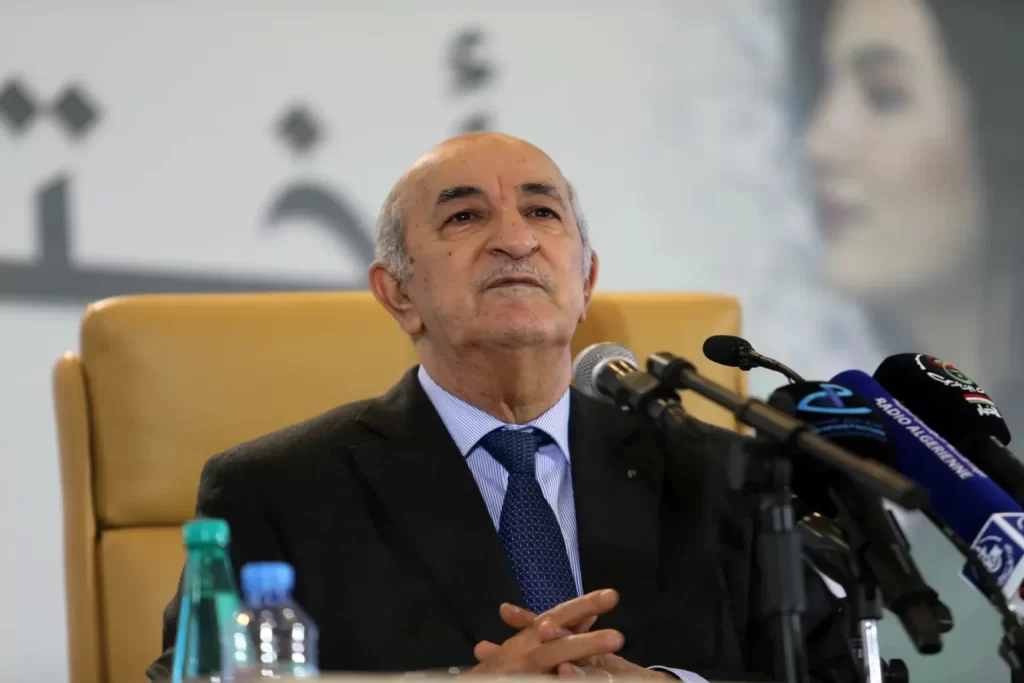
Broader Political Opposition to the Arab Peace Initiative
Several political parties in Algeria have expressed reservations about the Arab Peace Initiative, which Algeria officially references when addressing the Palestinian issue. Critics argue that it legitimizes the surrender of historical Palestinian lands.
Beyond Islamist parties, the leftist Workers’ Party has repeatedly called for abandoning the Arab Peace Initiative, branding it a “collective surrender plan orchestrated by the Arab League.”
During Palestinian President Mahmoud Abbas’s visit to Algeria in 2022, the Workers’ Party reaffirmed its opposition to the initiative, stating that it completely contradicts the aspirations and struggle of the Palestinian people and disrespects their sacrifices. The party insisted that Algeria’s position must align with Palestinian resistance rather than conform to the Arab League, whose majority of members have normalized ties with Israel.
A Strategic Move or a Diplomatic Trap?
In contrast to the critical voices, some observers interpreted Tebboune’s statement as a clever diplomatic maneuver aimed at presenting a clear vision of a solution to the U.S. administration. Given Algeria’s deep belief that Israel will never accept a Palestinian state based on 1967 borders, such a stance could shield Algeria from future normalization pressures, unlike other Arab nations that succumbed to the Abraham Accords.
Notably, when President Tebboune hosted former U.S. Secretary of State Antony Blinken, he made similar remarks, stating that Algeria has no issue with Israel if a Palestinian state is established. This further suggests that Tebboune’s comments were strategically calculated to counter external diplomatic pressure.


